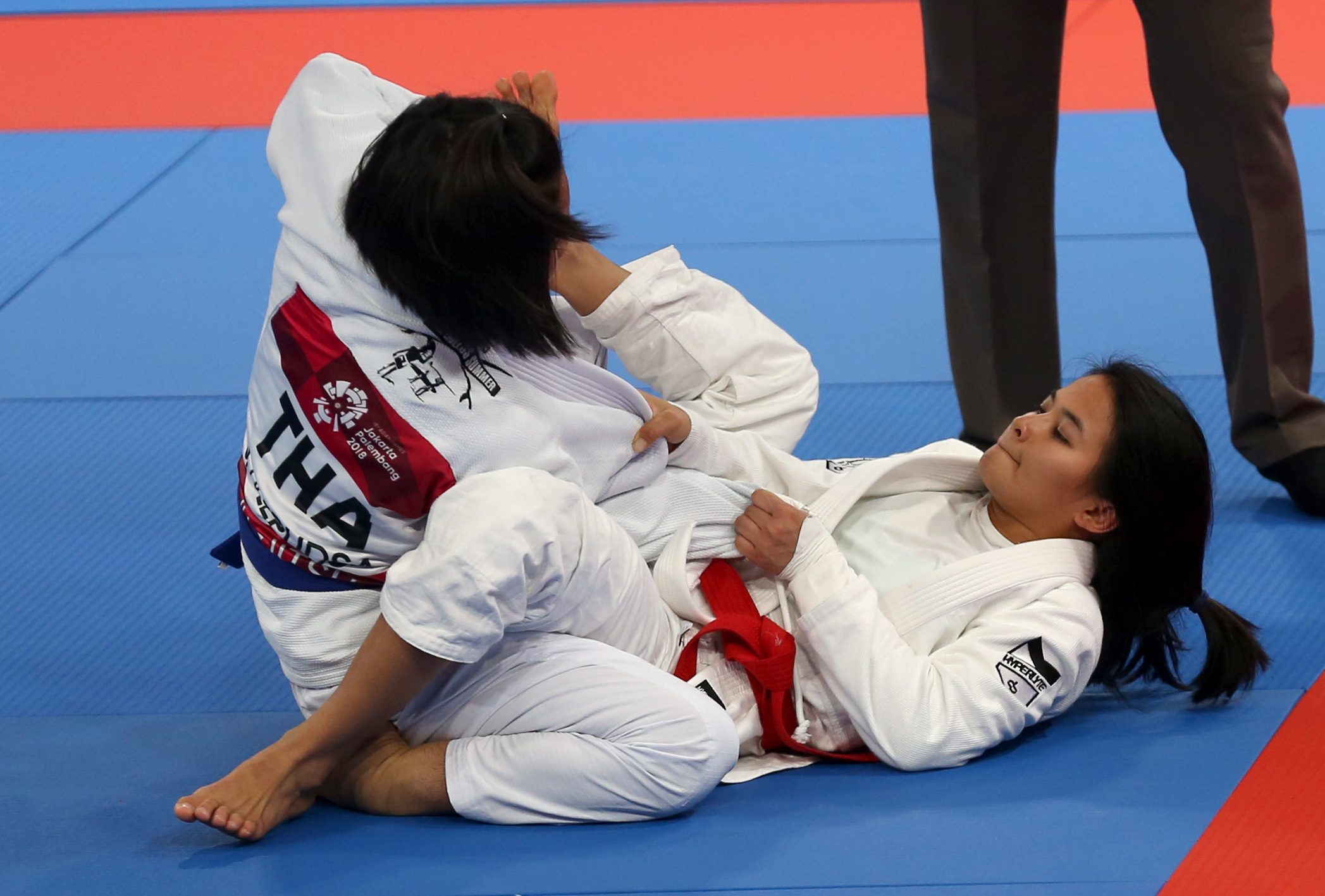SUMMARY
This is AI generated summarization, which may have errors. For context, always refer to the full article.

MANILA, Philippines – As jiu-jitsu made its highly-anticipated debut in the 2019 Southeast Asian Games, the sport’s homegrown talents left a lasting impression, hauling 5 golds to go along with 3 silver and 3 bronze medals.
Meggie Ochoa, who captured 3 straight gold medals from 2014 to 2016 at the World Jiu-Jitsu Championship, bannered the Philippines’ jiu-jitsu campaign.
Ochoa prevailed over Vietnam’s Dao Le Thu Thang, 13-0, in the finals of the women’s 45kg category as Carlo Peña, Dean Michael Roxas, Adrian Rodolfo Erwin Guggenheim, and Annie Ramirez also delivered gold medals.
Though the nation is heavily engrossed with basketball, boxing, billiards, and currently volleyball, one Filipino practitioner believes that jiu-jitsu could find a foothold in the Parthenon of Philippine sports.
Franco Rulloda, who earned his black belt in Brazilian jiu-jitsu under the tutelage of lifelong martial artist Alvin Aguilar this past May, sees a bright future for Filipinos to shine in the discipline as it does not require height like basketball.
“The fighting spirit and passion for combat sports makes Brazilian jiu-jitsu perfect for Filipinos. It is honing one’s physical attributes and using acquired knowledge to his or her advantage. It does not require too much strength, height, and athleticism,” he explained.
Jiu-jitsu promotes the concept that a smaller person can successfully defend against a bigger and heavier foe by using proper technique, leverage, and taking the fight to the ground before applying joint-locks and chokeholds to subdue the opponent.
According to Rulloda, Filipinos are tailor-made for the martial art because most of the recognized and successful Pinoy athletes come from combat sports.
“Martial arts have deep roots in Filipino culture. History has proven that Filipinos have that warrior spirit. Fighting has been ingrained in every Pinoy’s DNA that most of the recognized Filipino athletes are the ones in combat sports like Manny Pacquiao, Nonito Donaire, Eduard Folayang, and the list goes on,” he said.
Aguilar, who holds the distinction as the first homegrown Filipino black belt in Brazilian jiu-jitsu, conceded to the fact that the martial art has come a long way since he first piloted a class consisting of only 5 persons at the garage of his house.
“Back then, jiu-jitsu was only comprised of 4 or 5 people. Right now, we have at least more than a thousand competitors. I am very happy with the level and the standard that we’ve already established here in the Philippines because we’ve produced a lot of champions,” Aguilar shared.
“In Southeast Asia, we are No. 1 for sure. In Asia, definitely we are in the top 3. These are the things we should take advantage of. We have so many good grapplers. Everybody here is so good, not just from my team. You put them in any competition around the world and they will always be able to produce,” he added.
The Philippines now houses the most number of jiu-jitsu black belts in the Southeast Asian region, with a stellar list that includes Aguilar, Rulloda, May Masuda, John Baylon, Fritz Rodriguez, Pichon Garcia, Allan Co, Toffy Ilagan, and Froilan Sarenas.
Moreover, there are 10 clubs in the country that have been duly recognized by the International Brazilian Jiu-Jitsu Federation, including DEFTAC-Ribeiro, Atos Philippines, KMA-Fabricio, John Baylon BJJ, and Cobrinha BJJ Manila.
With the Philippines gradually establishing its reputation as one of the best countries for jiu-jitsu, Rulloda is confident that Filipinos could dominate the sport.
“For the past few years, we have proven that Filipinos can excel in this specific sport. We have the potential to do great things and take jiu-jitsu to the next level, not only here in our country, but to the Asian level, and even worldwide,” he said. – Rappler.com
Add a comment
How does this make you feel?
There are no comments yet. Add your comment to start the conversation.